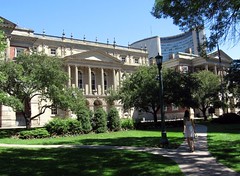 If you received a letter asking you to consent to disciplinary action, would you say yes? The Law Society of Canada is banking on it; they’ve just introduced a new mentoring protocol for lawyers whose in-court conduct is deemed by a judge to be in need of correction.
If you received a letter asking you to consent to disciplinary action, would you say yes? The Law Society of Canada is banking on it; they’ve just introduced a new mentoring protocol for lawyers whose in-court conduct is deemed by a judge to be in need of correction.
The objective is to offer an alternative to the legal community that falls between between doing nothing and filing formal complaints. Not only is the protocol voluntary, it’s also confidential; the judge who made the recommendation will only know whether or not a mentoring session took place, and no record of the action will appear on the lawyer’s public profile.
Here’s how it works:
- A judge determines that a lawyer’s conduct is in need of remediation, but is not so egregious as to warrant a formal complaint.
- The judge alerts the Law Society, which in turn makes arrangements for a mentoring offer from one of the three legal organizations representing Ontario lawyers — Criminal Lawyers’ Association (criminal defence matters), the Advocates’ Society (civil matters) or the Ministry of the Attorney General (matters involving Crown counsel).
- A letter [PDF, see Appendix A on the third page] is sent to the lawyer offering mentorship with a senior counsel. If the lawyer accepts, the mentor then makes contact to arrange a meeting. The form and content of the meeting is up to the mentor.
- Once the meeting is complete, the mentor completes a form to state that the mentoring session took place, and files it with the Law Society. The society shares this information with the judge. No other details about the session are reported.
As you might expect, the question of “reluctant mentees” came up right away when this protocol was discussed at the Law Society’s latest Convocation. A first refusal of a mentoring offer would generally result in no further action. But if the lawyer was recommended for mentoring a second time, the initial refusal would be taken into account by the Law Society — which reserves the right to escalate a mentoring recommendation into a formal disciplinary action.
This new system was established in response to the Code/LeSage Report, a review initialized by Attorney General Chris Bentley to identify solutions to speed and streamline the process of moving cases through the court system. One of the problems the report identified was the conduct of counsel; there was a perception that the Law Society needed to take more decisive action, particularly in the case of younger lawyers. Judges sought an avenue they could take with lawyers exhibiting questionable conduct that would result in improved courtroom behaviour, without the serious ramifications of launching a full investigation.
The protocol has been agreed to by the Superior Court of Justice and the Ontario Court of Justice, and has been approved in principle by the three legal organizations.
Photo by Oliver Mallich

